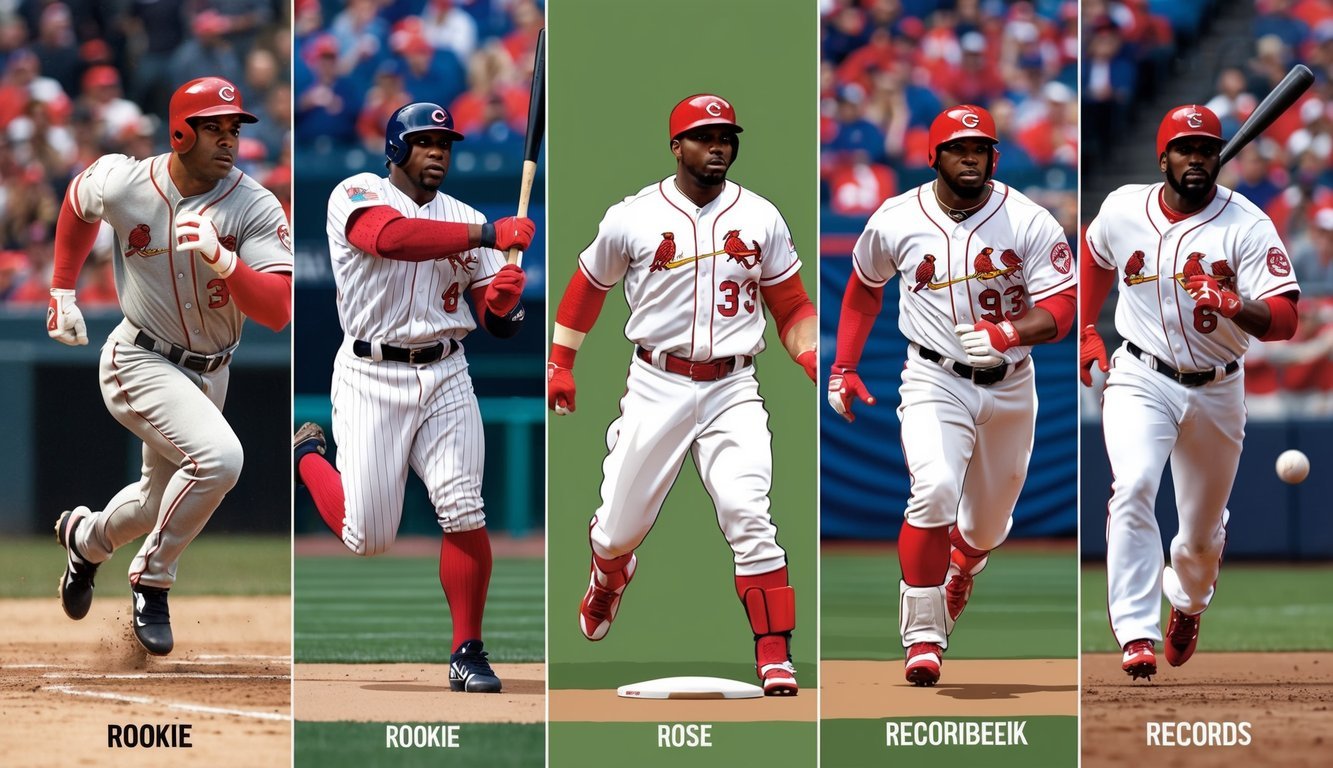Pete Rose, born April 14, 1941, in Cincinnati, Ohio, left an indelible mark on baseball history.
Nicknamed “Charlie Hustle” for his relentless work ethic, Rose became one of the sport’s most iconic and controversial figures.
Throughout his 24-year career, Pete Rose amassed an astounding 4,256 hits, surpassing Ty Cobb’s long-standing record of 4,189. This remarkable achievement cemented his place among baseball’s elite.
Rose’s journey began with his hometown team, the Cincinnati Reds, where he spent the majority of his playing days.
Rose’s versatility on the field was matched only by his passion for the game.
He earned 17 All-Star selections, won three batting titles, and played a crucial role in three World Series championships.
His impact on baseball extended beyond statistics, inspiring generations of players with his unwavering dedication and competitive spirit.
Early Life and Career Beginnings
Peter Edward Rose was born on April 14, 1941, in Cincinnati, Ohio.
His passion for baseball developed early, setting the stage for his remarkable journey in the sport.
High School and Early Baseball
Rose attended Western Hills High School in Cincinnati, where he honed his baseball skills.
He played multiple positions, showcasing his versatility on the field.
His coaches recognized his exceptional work ethic and competitive drive, traits that would define his future career.
Rose’s high school years were marked by impressive performances.
He led his team in batting average and earned all-city honors.
His dedication to practice and improvement was evident, often spending extra hours perfecting his swing and fielding techniques.
Major League Baseball Draft
In 1960, Rose signed with his hometown Cincinnati Reds as an amateur free agent.
The draft system wasn’t implemented until 1965, so teams could sign players directly out of high school.
Rose’s entry into professional baseball was modest.
He started in the minor leagues, playing for the Geneva Redlegs in the New York-Penn League.
His determination and hustle quickly caught the attention of Reds’ management.
By 1963, Rose had worked his way up to the major leagues.
He made his MLB debut on April 8, 1963.
His rookie season was impressive, earning him the National League Rookie of the Year award.
This early success set the stage for his legendary career.
Rise to Stardom with the Reds

Pete Rose’s career with the Cincinnati Reds catapulted him to baseball superstardom.
His exceptional performances and leadership helped shape one of the most dominant teams in MLB history.
Rookie of the Year Award
In 1963, Rose burst onto the Major League scene with the Reds.
His relentless hustle and impressive batting skills quickly caught attention.
Rose hit .273 and led the National League with 170 hits in his debut season.
This remarkable performance earned him the National League Rookie of the Year Award.
It was just the beginning of Rose’s impact on the Reds and baseball as a whole.
Rose’s versatility shone through as he played multiple positions, including second base and right field.
His adaptability would become a hallmark of his career.
Building the Big Red Machine
Throughout the late 1960s and early 1970s, Rose played a crucial role in forming the legendary “Big Red Machine.” This powerhouse Reds team dominated the National League.
Rose’s consistent hitting and fierce competitiveness set the tone for the team.
He earned All-Star selections in 1965, 1967, 1968, and 1969, solidifying his status as one of the game’s elite players.
His batting average during this period regularly exceeded .300, showcasing his exceptional hitting skills.
Rose’s leadership on and off the field helped mold the Reds into a formidable force.
MVP and World Series Highlights
Rose’s individual brilliance reached new heights in 1973.
He won the National League MVP award with a stellar .338 batting average and a league-leading 230 hits.
The pinnacle of Rose’s team success came in the mid-1970s.
He played a key role in the Reds’ back-to-back World Series victories in 1975 and 1976.
Rose’s clutch performances in these World Series cemented his legacy.
His tenacious play and timely hitting were instrumental in securing championships for Cincinnati.
During this period, Rose also added three batting titles to his impressive list of accomplishments.
His consistent excellence at the plate made him one of the most feared hitters in baseball.
Transitions and Achievements

Pete Rose’s career spanned multiple teams and included numerous record-breaking performances.
His versatility as a switch hitter contributed to his success across different positions and batting situations.
Philadelphia Phillies and Montreal Expos
Rose joined the Philadelphia Phillies in 1979, bringing his competitive spirit and hitting prowess to a new team.
He helped lead the Phillies to their first World Series championship in 1980.
Rose’s leadership and consistent performance were key factors in the team’s success.
In 1984, Rose signed with the Montreal Expos.
Though his time with the Expos was brief, he continued to showcase his hitting skills.
He played 95 games for Montreal before returning to his hometown Cincinnati Reds later that season.
Record-Breaking Performances
Rose’s most notable achievement came on September 11, 1985, when he surpassed Ty Cobb’s all-time hit record of 4,191.
This milestone cemented Rose’s place in baseball history.
He finished his career with 4,256 hits, a record that still stands today.
Other MLB records set by Rose include:
- Most career games played (3,562)
- Most career at-bats (14,053)
- Most career singles (3,215)
Rose’s consistency and longevity allowed him to accumulate these impressive numbers over his 24-year career.
Switch Hitter Success
As a switch hitter, Rose excelled from both sides of the plate.
This versatility made him a valuable asset in various lineup positions and against different pitchers.
Rose won two Silver Slugger Awards as a switch hitter, in 1981 and 1982.
These awards recognized Rose as one of the best offensive players at his position.
His success as a switch hitter also helped him earn spots on 17 All-Star teams throughout his career.
Managerial Tenure and Controversies
Pete Rose’s post-playing career saw him take on a managerial role with the Cincinnati Reds.
This period was marked by initial success but ultimately overshadowed by gambling allegations that led to his banishment from baseball.
Managing the Reds
In 1984, Rose returned to the Cincinnati Reds as a player-manager.
He led the team while still pursuing his quest for the all-time hits record.
Under his guidance, the Reds showed improvement, finishing second in the National League West in 1985 and 1986.
Rose’s hands-on approach and deep knowledge of the game earned respect from players.
He retired as a player in 1986 but continued managing.
The Reds finished second again in 1987 and 1988, showcasing Rose’s ability to nurture young talent and maintain competitiveness.
Gambling Allegations and Banishment
Rose’s managerial career came to an abrupt end in 1989 amid serious gambling allegations.
An investigation led by MLB Commissioner A. Bartlett Giamatti uncovered evidence that Rose had bet on baseball games, including those involving the Reds.
On August 24, 1989, Rose agreed to a permanent placement on baseball’s ineligible list.
This decision effectively banned him from working in professional baseball and eliminated his chances for Hall of Fame induction.
Despite multiple attempts at reinstatement over the years, Rose remains permanently ineligible.
His case continues to spark debates about the balance between celebrating on-field achievements and upholding the integrity of the game.
Legacy and Post-Baseball Life

Pete Rose’s impact on baseball extends far beyond his playing days.
His achievements and controversies continue to shape discussions about the sport’s history and ethics.
Hall of Fame Debate
Pete Rose’s exclusion from the Baseball Hall of Fame remains a hot topic.
Despite his record-breaking 4,256 hits, Rose’s lifetime ban for gambling on baseball prevents his induction.
Supporters argue his on-field accomplishments merit recognition.
Critics maintain his actions compromised the game’s integrity.
The debate highlights the complex relationship between performance and character in sports.
Rose’s absence from Cooperstown hasn’t diminished his popularity among fans.
Many still consider him one of the greatest players ever.
His No. 14 jersey was retired by the Cincinnati Reds in 2016, honoring his contributions to the team.
Autobiography and Media
Rose has shared his story through various media outlets.
His autobiography, “My Prison Without Bars,” was published in 2004.
The book offered insights into his career and gambling issues.
It sparked renewed interest in his case.
He’s appeared in documentaries and interviews, discussing his life and career.
Rose has been candid about his mistakes and desire for redemption.
His media presence keeps him in the public eye.
Rose’s baseball expertise is still valued.
He’s worked as a sports commentator and analyst, sharing his knowledge with new generations of fans.
Personal Life and Philanthropy
Off the field, Rose has faced personal challenges.
He’s been married three times and has five children.
His family life has often been in the spotlight.
Rose has participated in charitable events, including celebrity golf tournaments.
He’s used his fame to support various causes, though not as prominently as some other sports figures.
The Roberto Clemente Award, given for sportsmanship and community involvement, eluded Rose during his career.
However, he’s made efforts to give back in recent years.
Rose’s legacy remains complex.
His on-field brilliance is undeniable, but his off-field actions continue to shape public perception.
The debate over his place in baseball history shows no signs of fading.
Some argue that his accomplishments merit recognition despite his controversies, while others believe his actions disqualify him from the sport’s highest honors.
Comparisons to the Ted Williams baseball legacy often arise, as both players demonstrated unparalleled dedication to hitting, though their reputations unfolded in dramatically different ways.
As discussions persist, Rose’s impact on the game remains a topic of passionate debate.
